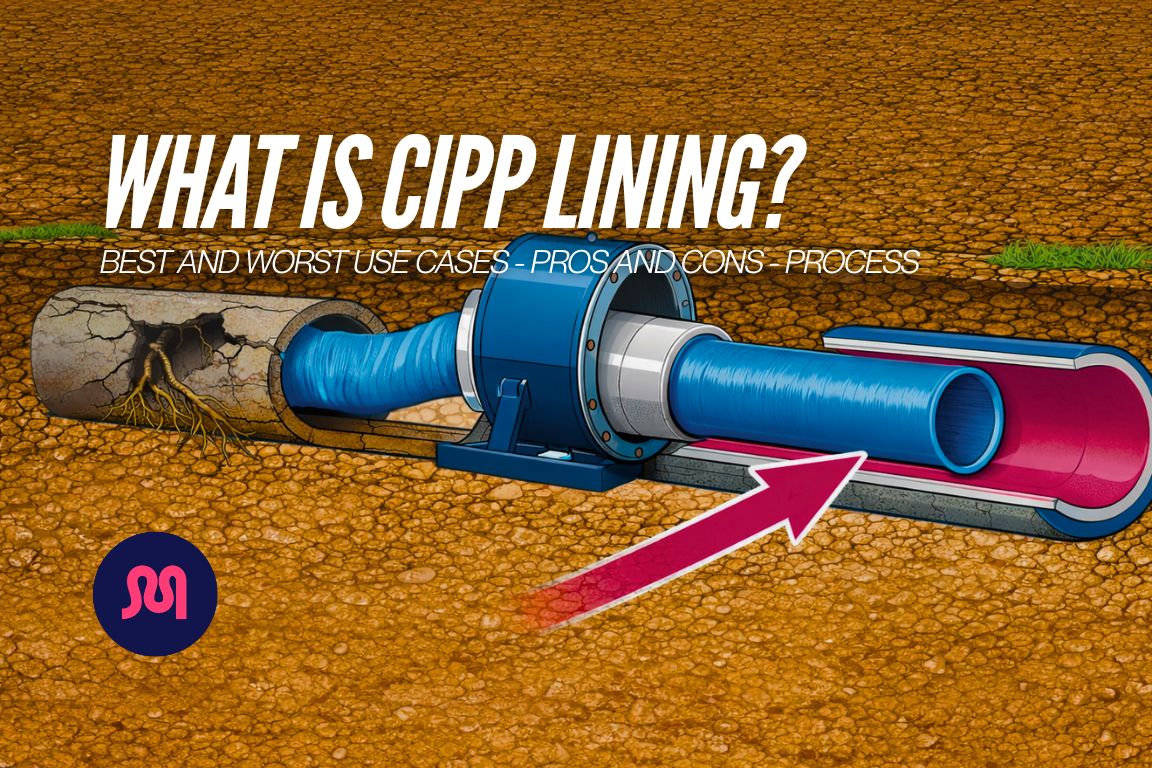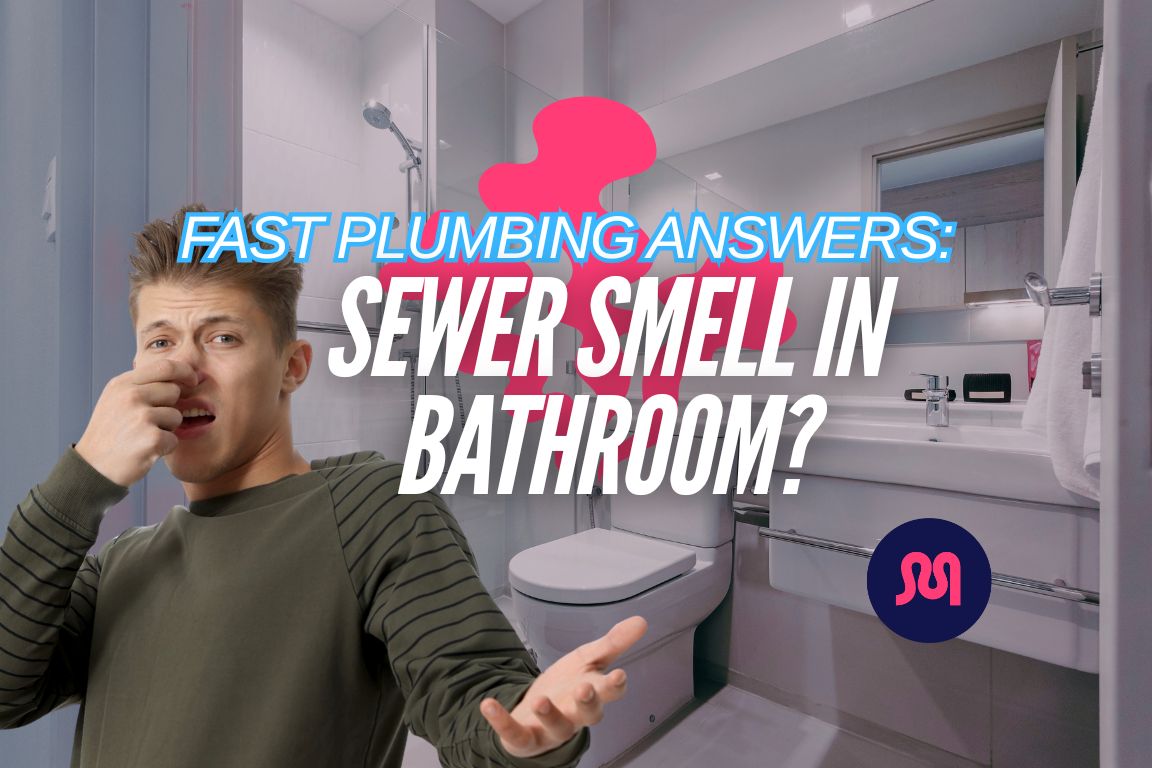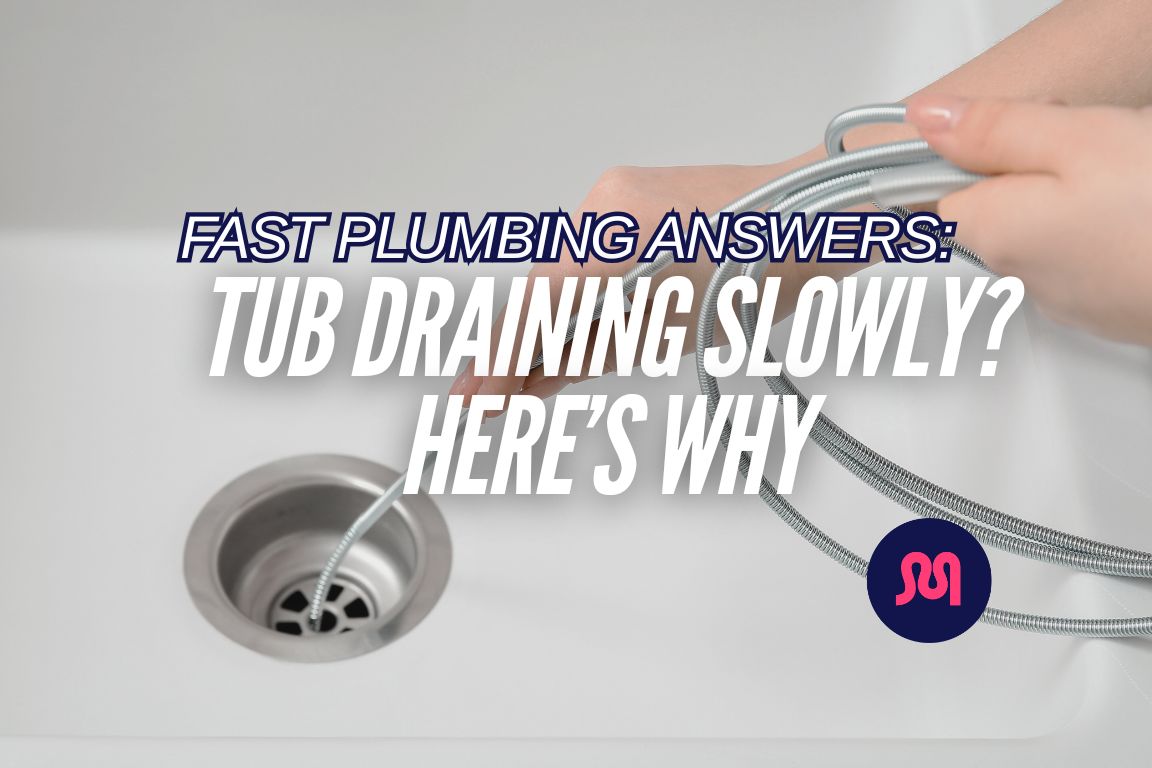3 Ways to Never Descale Your Tankless Water Heater Again
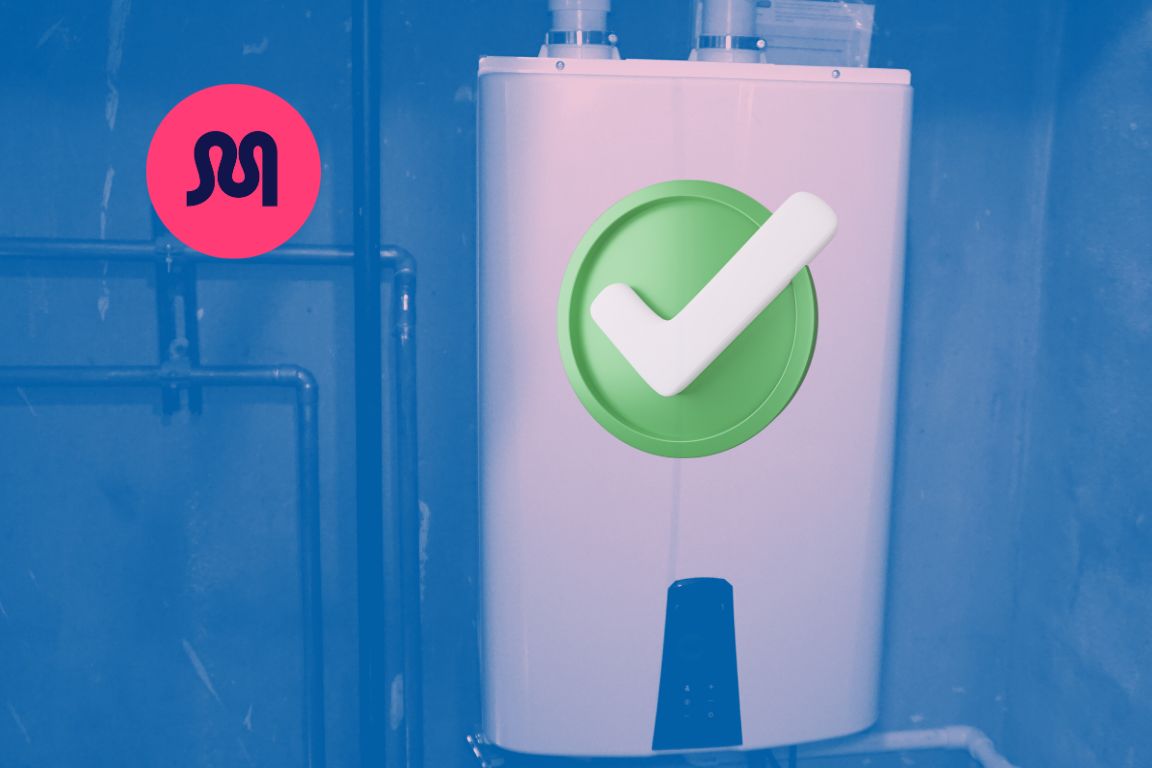
table of contents
table of contents
The best part of buying a tankless water heater to improve efficiency and lower energy bills. The worst part is descaling your system- You’re stuck between spending $300-$600 on descaling service, or risking expensive internal damage to the unit if you don’t do it.
But what if you never had to descale your tankless water heater again?
Mother Modern Plumbing cares about smart plumbing solutions that improve your daily life. Our Master Plumbers recommend three solutions to reduce scale in your tankless:
- Built-in scale prevention. Recently, A.O. Smith developed X3 Scale Prevention Technology, an on-board scale reducer they claim extends the lifespan of your unit up to 300%.
- Inline water softeners. A great soft water solution, without changing out your existing tankless or installing a whole home softening system.
- Whole home water softeners. The ideal solution for homeowners who want their entire plumbing system protected from hard water.
Dallas residents: Interested in a tankless water heater with built-in scale prevention? Call Mother 7 days a week, and we’ll have a licensed technician there within 24 hours.
{{tankless-water-heater-installation="/services/tankless-water-heater-installation"}}
Why Hard Water is Bad for Tankless Water Heaters
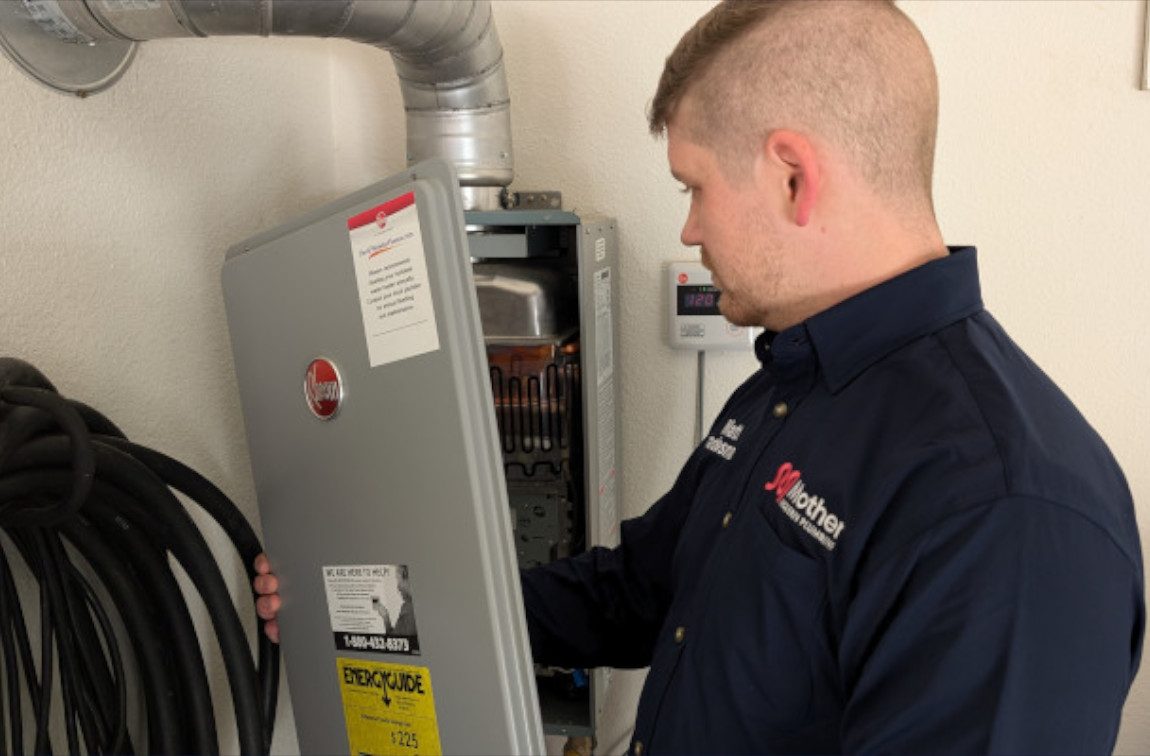
Hard water contains minerals like calcium and magnesium that naturally accumulate on surfaces. You’ve probably noticed white, gunky calcium buildups on your faucets and your shower head.
Many homeowners believe switching to a tankless water heater removes mineral scaling issues. But just because there’s no visible tank corrosion or scale buildup doesn’t mean hard water is safe for on-demand systems.
Here are seven common problems associated with increased scale in your tankless water heater:
- Increased utility bills: Scale accumulation forces your tankless unit to work harder to produce on-demand hot water- this leads to spikes in your gas or electric bill (whichever powers your system).
- Failed ignition: Proper water flow is crucial for proper ignition to occur. Scaling not only blocks your cold water intake filter, it can build up on the crucial spark electrodes in the ignition system.
- No hot water: Scale buildup on the heat exchanger causes multiple problems in hot water delivery. “Over time, minerals coat the inside of the heat exchanger,” Dillon says. “That prevents efficient heat transfer- your burner or heating element is working fine, but the water isn’t getting hot enough.”
- Low water pressure: Decreased flow in your hot water using appliances and fixtures (especially the shower) indicates scaling in the delivery line.
- Popping noises: Strange noises from your on-demand system indicates scale buildup.
- Temperature readings: Mineral scaling interferes with temperature readings from the heat exchange by your thermistors- the sensors that tell your tankless water heater’s control board how hot the water is.
- Frequent error codes: The added strain of scale in the system causes the unit to display error codes- and in severe cases, shut down completely.
Now, let’s look at the three solutions our Master Plumbers recommend to eliminate mineral scaling issues and extend the lifespan of your on-demand water heater.
Built-In Scale Prevention for Tankless Water Heaters
Innovative tankless water heater manufacturers are nipping scale problems before they start. On-board scale prevention technology changes the chemistry of hard water to keep scale formation from occurring in your system.
This mineral modification approach works a lot like water softeners- changing the chemical composition of calcium and magnesium in your water supply. Most scale prevention systems in tankless units work in one of two ways:
- Catalytic media: A cartridge converts dissolved calcium and magnesium into microscopic crystals. These crystals are too small to stick to the surfaces of components in your system.
- Electrolytic or magnetic field: Several scale prevention systems use these fields to alter minerals and reduce their ability to stick to surfaces.
A third type of scale prevention technology in on-demand water heaters are based on bond inhibition (instead of changing the chemical makeup of dissolved minerals). This is a less established method- should it prove effective, we’ll provide updates.
Meet A.O. Smith’s X3 Scale Prevention Technology
X3 Scale Prevention is a built-in descaling process from A.O. Smith and State Water Heaters. It’s currently available in a variety of their gas tankless water heater models.
Initial testing shows promising results. Tankless systems equipped with X3 technology eliminate scale buildup in heat exchangers. We know this because A.O. Smith ran 15 years’ worth of water through these systems to test them.
An added benefit: this technology is approved to work with recirculation pumps. These pumps add a return line for cold water that’s left in your pipes after you turn the hot water off. That water is re-heated so you have hot water on-demand when you turn the faucet back on.
This means no cold water sandwich effect when you step in the shower.
Our plumbers like the Adapt+ Premium tankless water heater
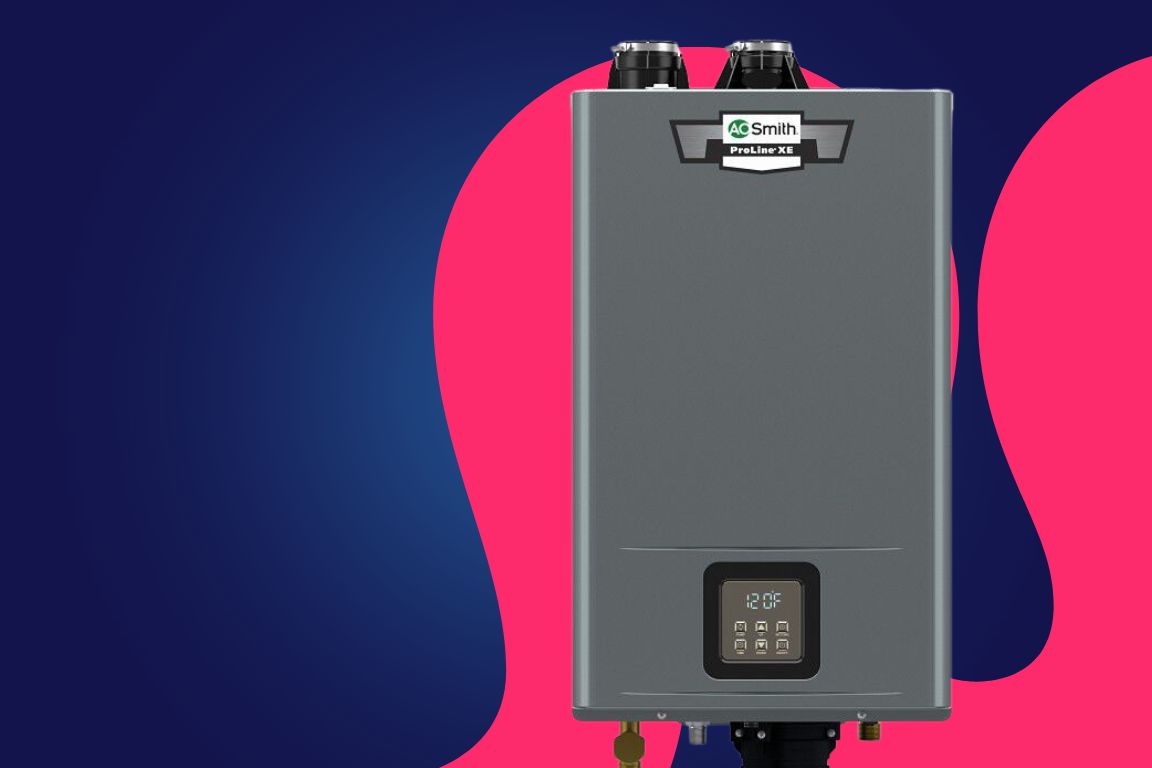
We consulted our Master Plumbers, as well as James Wickersham, Territory Sales Manager for Plumbing & Electrical at Pepco. They encourage homeowners to consider the Adapt™+ Premium tankless water heater from A.O. Smith and State Water Heaters.
The Adapt+ model includes X3 Scale Prevention Technology and is ENERGY STAR certified. It offers an integrated recirculation pump to ensure consistent on-demand hot water delivery.
Adapt+ Premium tankless systems are fully field convertible from natural gas to liquid propane, and can be installed outdoors with a separate Outdoor Vent Cap kit.
Here are three features we really like in Adapt tankless water heaters:
- Strong savings vs. standard natural gas water heaters. The average homeowner saves an estimated $116 per year on system operation. This breaks down to roughly $10/month reduction of home energy bills vs. a 50-gallon water heater tank.
- Built-in control display. Adapt+ Premium systems offer easy review of recirculation schedules, error codes and user settings via the control display. Our plumbers find this display easy to operate, even for first-time tankless buyers.
- Remote app access. Optional remote activation capabilities are a great feature on the Adapt+ Premium. Manage settings, set schedules and activate your tankless system.
Many homeowners are eligible for product rebates on Adapt+ systems through ENERGY STAR or local incentives.
Editor’s note: Mother Modern Plumbing installs Adapt+ systems, and James Wickersham is our manufacturer representative. We felt this was important to disclose to our readers. We don’t have any exclusivity agreements- Mother is free to choose the best brands and products for our customers. The Adapt+ Premium was crafted using a great deal of plumber feedback.
Three Ways Tankless Scale Prevention Saves You Money
New technology is always exciting. But you don’t care much about plumbers “geeking out”- you need to know that buying a tankless system with scale prevention pays itself back over time- and then saves you even more money.
Here are the 3 ways investing in a tankless water heater with scale prevention technology will save your household money, both short and long-term:
1. Reduced tankless water heater repair costs
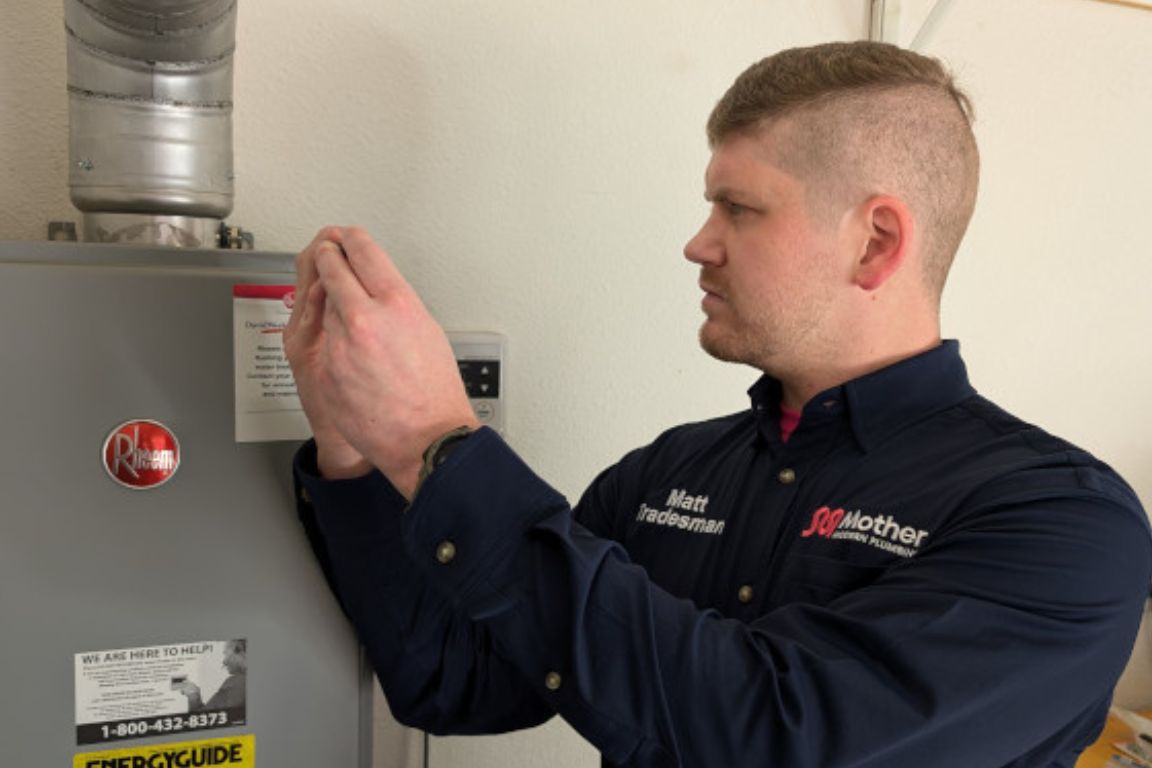
“Scale buildup in internal components is the #1 reason tankless water heaters don’t produce hot water,” says our Master Plumber Dillon Ashton.
Built-in scale prevention reduces hard mineral buildup throughout your tankless. Here are the 3 core components where it matters most:
- Inlet screen. “If the filter’s clogged with debris, the unit won’t sense enough flow to fire up,” Dillon explains. “This is especially true with the filter’s inlet screen.”
- Heat exchanger. The component in your tankless water heater that transfers heat from the system’s heat source to the water supply.
- Ignition components. When the spark electrodes and/or flame sensor are affected by mineral deposits, it interferes with the ignition process.
{{fast-plumbing-answers-tankless-water-heater-won-t-ignite="/blogs/fast-plumbing-answers-tankless-water-heater-won-t-ignite"}}
Bottom line: The average household with a tankless water heater spends between $150 and $550 per year on repairs over the 15-year lifespan of a tankless system. A majority of these costs are eliminated by adding a descaling element.
2. Reduced tankless water heater maintenance costs
Scale accumulation is also the primary driver of tankless water heater maintenance- especially in the Dallas area, which has America’s sixth hardest water.
Most homeowners schedule tankless descaling service once per year. (It’s best to descale every 6-9 months in regions with hard water like Dallas.)
Bottom line: The average tankless maintenance service call costs between $175-$350. Even if you DIY descaling, the supplies still cost $100-$120. Over your system’s 15-year lifespan, that’s a savings of $1,500-$5,250.
3. That one major tankless repair call
Most homeowners experience one major disruption to their tankless water heater over its lifespan. As Dillon stated, most repair issues are driven by mineral scaling and accumulation.
Stop that scaling before it starts, and you’ll avoid major repair costs like these:
- Cracked or leaking pipe: $175-$350
- Significant internal descaling: $250-$375
- Heating element or igniter repairs: $450-$825
- Heat exchanger replacement: $650-$1,300
Still need descalng help? Follow our new guide to compare the pros, cons and cost of DIY vs. hiring a plumber:
{{how-to-descale-tankless-water-heater="/blogs/how-to-descale-tankless-water-heater"}}
Inline Water Softeners: Point-of-Use Scale Prevention
Not looking to buy a new tankless unit or pay for a whole home water softening system? Install an inline water softening device specifically for your tankless water heater.
Your plumber easily installs the water softener on the main water line before it reaches your on-demand heater. Installation must follow the specific guidelines in your system’s manufacturer’s guide- it’s best to hire a pro for this service.
How inline water softeners benefit your tankless
Installing an inline water softener for your tankless water heater has four core benefits:
- Prevents mineral scaling: Your water softener’s one job is to prevent scale buildup in your heater. Keep calcium and magnesium deposits off crucial components like your inlet filter, heat exchanger and ignition.
- Improves efficiency: Without mineral buildup on its internal components, your tankless operates at peak efficiency- ensuring hot water delivery and keeping energy bills low.
- Maintains lifespan: Ensure your tankless unit survives as long as it’s supposed to, all with less regular maintenance and descaling concerns.
- Protects pipe health: The incoming water line to your tankless also benefits from reduced hard water and mineral buildup.
How inline water softeners save you money
As soft water passes through your tankless, it doesn’t just improve efficiency. Here’s how an inline water softener keeps money in your wallet:
- Warranty protection: Many manufacturers suggest water softeners for tankless units in hard water regions. Inline softening systems help protect your product warranty.
- Reduced maintenance: The average descaling service costs between $300-$600 (and $450-$600 in hard water regions like Dallas). Less scaling = less appointments.
- Reduced repairs: Less exposure to hard minerals means cleaner internal components and reduced risk of tankless water heater damage.
Whole Home Water Softeners: Solutions Beyond Your Tankless
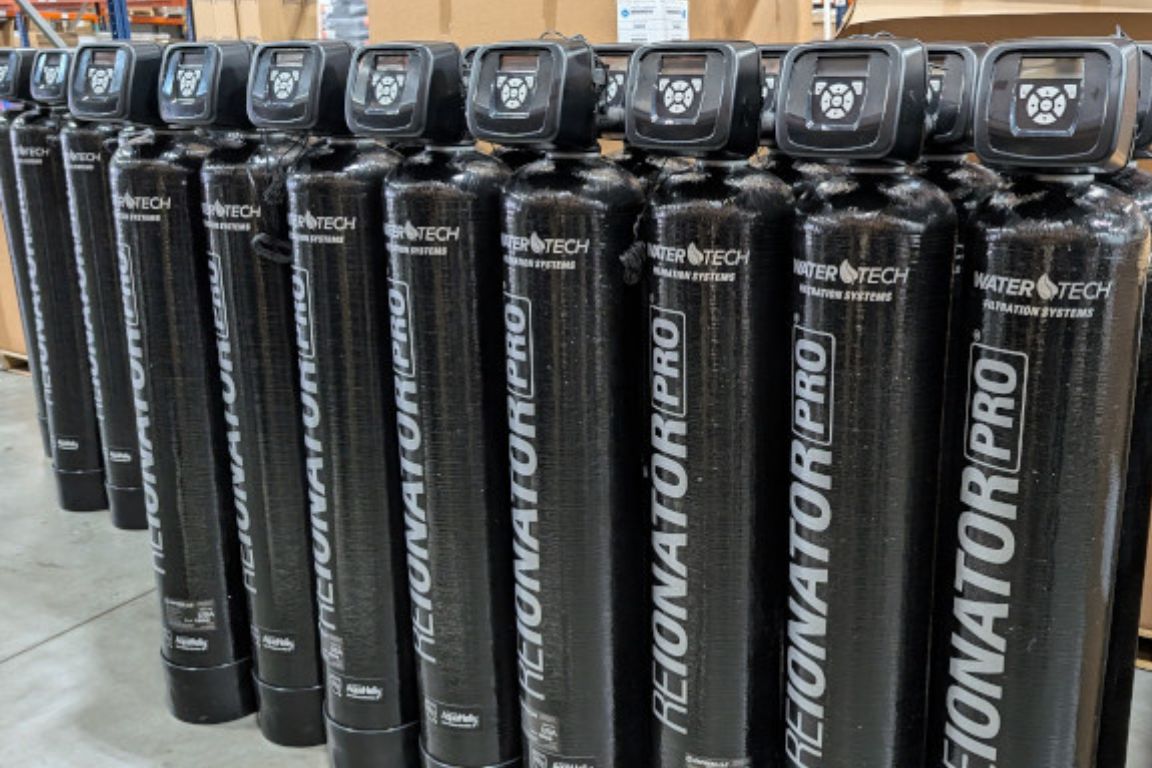
Are all your pipes and appliances suffering from hard water and mineral scaling? Are you sick of brittle hair in the shower and dingy clothes in the washing machine?
Whole home water softeners provide the same benefits as inline softeners for your tankless water heater- and extend those benefits throughout your home plumbing system.
Benefits of soft water throughout your home
We’ve noted how soft water improves efficiency, prevents scaling and reduces energy costs for your tankless water heater.
Let’s look at how whole home water softeners impact other areas of your home:
- Appliances: Reduced scaling to all your water-using appliances- dishwasher, washing machine, refrigerator, ice maker and more.
- Clothing: Hard minerals leave clothes dingy and dull after washing.
- Dishes: Reduce filmy mineral scaling on your dishes and glassware.
- Faucets: No more calcium deposits and buildup on your faucets and shower heads.
- Pipes: Water pipes inside your home stay free of internal scaling on pipe walls.
Study: whole home water softeners save $1,550 per year
Recently, Mother’s research team compiled internal service data with reports from WaterTech, an industry leader in home water softening, filtration and condition systems.
The combined study found that homeowners who install whole home water softening systems save an average of $1,550 per year on repairs, maintenance, cleaning supplies and energy bills.
Here are some key savings we uncovered in the article:
- Plumbing and appliance repairs: $122.40 per year
- Soaps and cleaning aids: $1,052.64 per year
- Clothing and linens: $238.00 per year
- Home energy: $87.64 per year
Love this solution? Call us 7 days a week for no-pressure guidance through water softener installation in Dallas.
{{whole-home-water-softener-installation="/services/whole-home-water-softener-installation"}}
Put Dallas Tankless Descaling on Autopilot with Mother
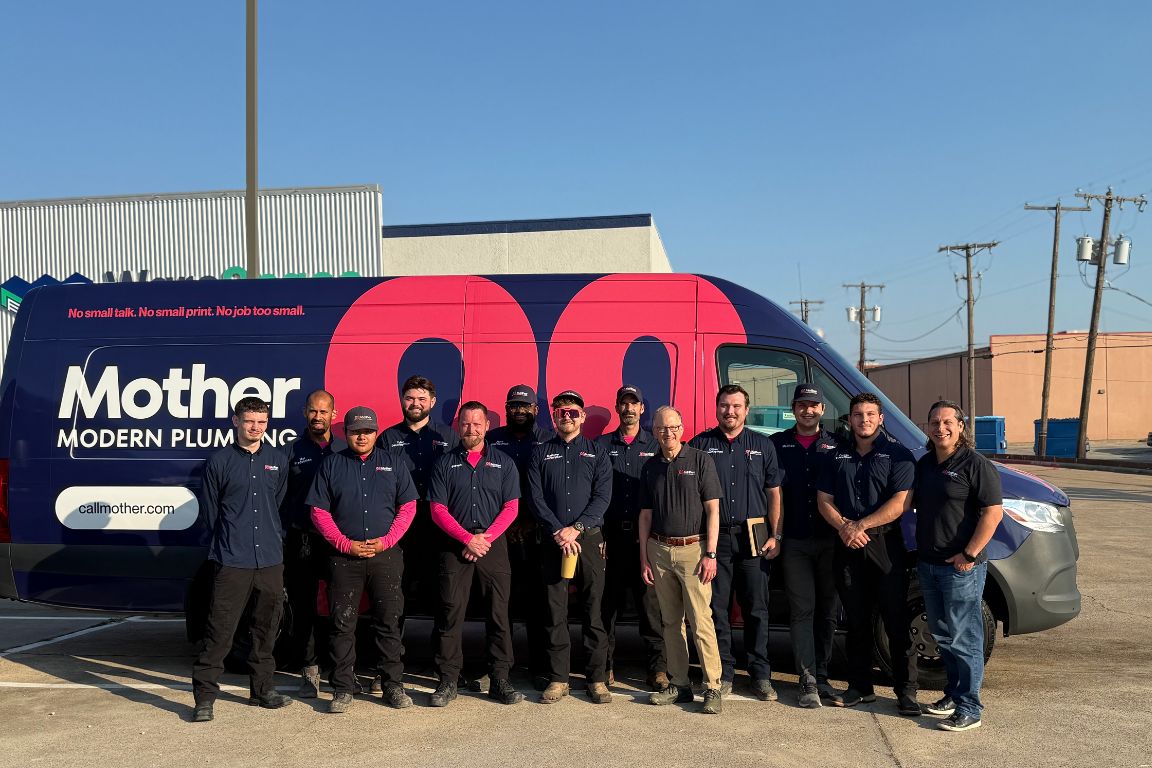
Descaling your tankless water heater eliminates inefficiency, improves hot water delivery, and improves the lifespan of your system.
Smart solutions like built-in descaling systems and water softening systems allow homeowners to keep scale out without paying for maintenance.
That’s a modern, proactive approach our plumbers love.
If you’re considering a new tankless water heater purchase, look into models with built-in scale prevention technology. The Adapt+ tankless from A.O. Smith is an excellent option available through reputable plumbers like Mother Modern Plumbing.
Live in Dallas-Fort Worth? Call Mother 7 days a week and discover smarter tankless water heaters with built-in scale prevention. Save scaling, save money, and save stress.
{{tankless-water-heater-installation="/services/tankless-water-heater-installation"}}
Common Q’s about Water Heaters
Are tankless water heaters more efficient than tank water heaters?
Yes, the U.S. Department of Energy reports that tankless water heaters are up to 34% more efficient than tank water heaters. That's because tankless heaters don’t store water. Instead, they heat water on demand and only when needed.
How often should I descale my tankless water heater?
Perform tankless water heater descaling once every 6-12 months in most areas to eliminate mineral buildup in the system.
If you live in areas with extremely hard water- such as Dallas-Fort Worth- consider decaling your on-demand hot water heater every 6-8 months (roughly twice a year). Limescale is particularly hard on tankless units in our area.
Can I get a tax credit for a tankless water heater?
Yes, natural gas tankless water heaters installed between 2023 and 2032 are eligible for the EnergyStar Energy Efficient Home Improvement Tax Credit. It covers 30% of the total installation cost up to $600. ENERGY STAR rated tankless water heater models with ≥ 0.95 UEF are eligible.
Do tankless water heaters lower your home insurance?
Tankless water heaters can reduce insurance premiums due to the reduced risk of not having a full tank in your home. Ask your insurance agent if any premium discounts apply to new water heater installation.


